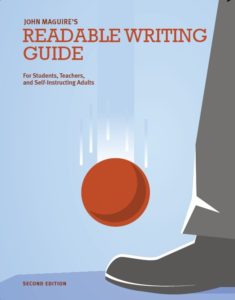Here are recent emails between me and a professor of philosophy I’ll call K.F. It’s an interesting discussion and I like KF’s seriousness about writing. I share this just for camaraderie’s sake. First me, then him, then me.
JM: Thanks for ordering the book yesterday. It will be mailed to you today. Attached is the answer key.
How did you find out about the CWG and what problem do you hope to solve with it? I see you teach at the University level. Are you a writing instructor, or do you teach something else? Where do you teach? I also wonder what student problems are most frustrating to you.
KF: Thanks for the answer key and the email. I’m really looking forward to reading your book. I’m a philosophy professor at the University of ___ and I’ve been reconsidering how I teach writing and how I employ writing in my classes to help students engage with the material. I’m also interested in writing as a parent and as the future head of our department’s graduate teaching methods course.
I’m a huge Doug Lemov fan–and through him, a fan of Judith Hochman. I’m convinced that many problems in student writing (and thinking) originate at the sentence level. Because students lack syntactic and lexical control, they struggle with thinking critically. Sadly, they’ve gotten little relevant writing instruction in K-12 or in university. Asking many students to write a five-page essay is analogous to asking me to repair my car’s transmission–in theory I could do it, but I don’t know the steps to get me there.
While searching for more Writing Revolution related articles, I came across Michael Laser’s article from 2015 at the Hechinger Report. That led me to your site. I liked that you started with the sentence. I also liked that you recognize the need to stick to “clear and minimal goals” and that the biggest challenge is determining which of those goals, if achieved, would produce the biggest bang. In this most recent semester, I decided to identify two principles of sentence revision for the students, which we would practice over and over. I don’t have time in my classes to do much more than that and I also worry that too much guidance ends up being counter-productive and distracting. I drew the two principles from Bizup and Williams’ book Style. I like the book and the principles–making sure the subject expresses the main character of a sentence and that the verb expresses the main action–but I worry that even these concepts might be a bit abstract and hard to grasp. So I’m curious to see what principles of revision I might discover in your book. The excerpt’s treatment of ‘drop it on your foot’ nouns intrigued me.
That’s a rather long account!
JM: Regarding your two principles of revision, they are fine. They just about do the job in my opinion. I have found that freshmen really need lots of practice even to see the verb in a sentence. But you can’t run hours of practice on seeing verbs because you would bore them and it would come to seem pointless to the majority. The way I get students to pay close attention to the words, the way a professional writer does, is to emphasize readability as Rudolf Flesch defined it long ago in The Art of Readable Writing. He was a computational linguist and he studied texts by counting words of different sorts. He’s the guy who learned that the general accessibility of a piece of writing had to do with short sentence lengths, low average syllable count, and the presence of people as named and speaking characters. I’ve adopted and slightly changed his approach. I tell students, more or less, “You must be clear to your readers and interesting; here are the patterns I want to see in your work from now on.”
The focus on the reader is highly deliberate, and over time, students find it interesting to work toward reader service. We do a lot of reading of each others’ work, but limit ourselves to certain questions useful for training student perception. I might say, “Let’s take a look at the first two paragraphs of Susan’s profile of her grandfather; what can we say about the verbs?”


Leave a Reply